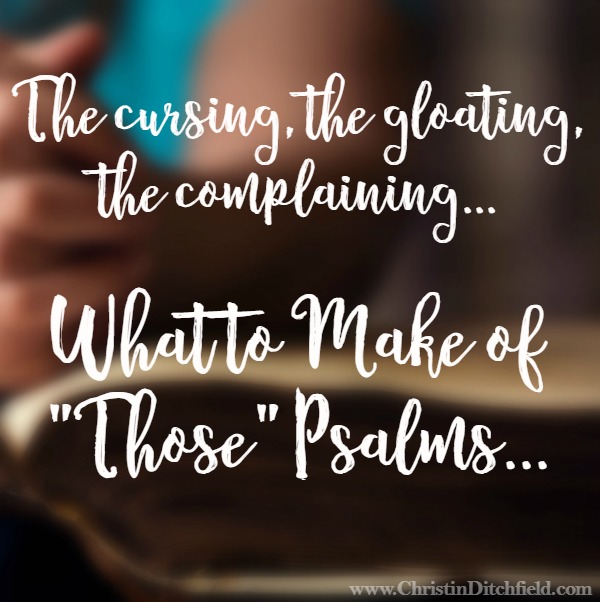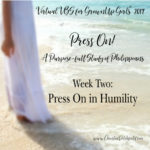You know the ones I mean…
The ones where the Psalmist declares his absolute innocence — proclaims himself guiltless — and denounces his enemies. The ones where he cries out for vindication and vengeance, calls down God’s wrath and judgment, revels a little raucously in his victories or sounds almost gleeful about the destruction of the wicked?
The ones that seem to contradict other passages of Scripture that tell us no one is righteous (“all have sinned”) and that we should forgive our enemies (“bless and not curse”).
Bible scholars explain that it’s really a lack of understanding on our part.
Here are 5 things to know about “those” psalms and how it’s possible for us to read them, pray them, apply them to our lives today…
1) On a human level, the Psalms help us to pour out our hearts to God, to express the depths of the varied emotions we feel, (hurt, anger, frustration, desperation, longing for justice, rejoicing in truth, triumph), and to know we are not alone. There are times when we are innocent, when we are victims, when we need deliverance, or when we can genuinely celebrate a hard-won victory — and the Psalms express that, the same way they express (at other times) our sorrow over our sins, our guilt and shame, our need for humility, repentance, forgiveness. The Psalms keep it — and us — real.
2) In a very real sense, our enemies are not so much the people in front of us, but the “spiritual forces” of evil — of darkness — at work in our own hearts and in the world around us. We’re talking about sin and temptation, the devil and his demons. It’s entirely Biblical to pray against those entities or to pray for their destruction. Of course, sometimes the enemy uses people…
However, the Bible teaches us to love people, pray for people, do good to people. Because other people’s bad behavior is not an excuse for us to behave badly. And God is the only one who knows who is His, and who isn’t, who will eventually come to embrace their brokenness and His grace — and who will not.
Scripture also teaches us that one day, those who utterly reject the love God has for them — those who don’t want His mercy and grace, those who willingly, eagerly choose wickedness and prefer darkness to light, will ultimately get what they have said they do want: to be separated from God forever.
It’s right and just — and God’s doing, not ours. His kingdom come, His will be done. That’s what we’re praying for — not personal vengeance, not about petty, peevish gripes or vendettas.
3) We can remember it cuts both ways. Just as the Psalmist proclaims his innocence in one psalm and his guilt in another (because both are true), he proclaims God’s wrath and vengeance on the wicked in one psalm, and God’s discipline (which looks a lot like wrath and vengeance) on His people in another.
God is just. When His people rebel against Him, sin against Him and against each other, He doesn’t look the other way.
Think about what that means for us today. For each of us personally.
If we don’t obey, if we don’t repent, if we harden our hearts, if we refuse His forgiveness and grace… what should we expect?
A severe mercy, perhaps. A love that says, “I won’t let you get away with this.”
Speaking of cutting both ways, some of us have been so devastated, so hurt and violated, so betrayed, that we don’t have any trouble relating to the Psalmist when he cries out for vengeance. But in his Reflections on the Psalms, C.S. Lewis points out that even if we can’t relate, it ought to give us pause… We should consider that our words, our actions, our behaviours might be so hurtful to others, that they feel this way about us!
God help us… and forgive us.
4) We can pray the Psalms remembering that they are prophetic and that we’re in the “in-between times” — still awaiting the fulfillment of them. Bible scholar N.T. Wright points out that the Psalms repeatedly reflect what the rest of Scripture teaches: God created us to rule and reign over the earth.
“God created the world in such a way that it was to be looked after by humans who reflect His image. When the humans rebelled, He did not rescind that project. Instead He called a human family in order that they might reflect not simply His wise ordering and stewardship into the world, but now also His rescuing love…”
The Psalms reflect “the rich, breathtaking vocation… and the dark tragic fact that this vocation, this rescue mission was to be undertaken by people who were themselves in sore need of the very same rescue…
“Israel’s constant and humiliating failure did not cause God to abandon the project to rescue the world through His chosen people… It is to David, or more specifically David’s Son and Heir, that the task has now devolved of bringing the nations into submission to Israel, God’s Creator.” (Wright, pgs 51-62 see below)
5) Finally, we can pray the Psalms in the Spirit of Jesus, from the perspective of Jesus, knowing they are His Word, not ours. I’ve touched on this already, but again: Jesus inspired these psalms and prayed them first, through the Psalmist. He could declare His righteousness because as the Son of God, He is righteous — and He teaches us to pray this way (repeating after Him) because we are righteous, in Him.
And though He Himself was sinless, He could pray a psalm that is a confession of sin because He “became sin” on the cross for us, when as the Son of Man, He took on our guilt and shame. And again, as Bonhoeffer says, He’s modeling for us how we are to pray.
Truly Jesus can declare victory over His enemies, victory over the wickedness of the world, over death and the grave — and it’s not at all unseemly or inappropriate of Him. Hallelujah!
Nor is it for us, when we pray as He has taught us, in keeping with His Spirit.
Yes, it’s true the Psalms can be hard to wrap our head around sometimes. It’s true some people have misunderstood “these” difficult psalms or wilfully misappropriated them, used them to justify cultivating an attitude of bitterness, cursing others, or seeking revenge.
But we shouldn’t let it rob us of these great treasures. We shouldn’t stop reading the Psalms and using them as God intended — for His glory and our good!

I’ve been reading Dietrich Bonhoeffer’s Psalms, N.T. Wright’s The Case for the Psalms, C.S. Lewis’s Reflections on the Psalms, and commentaries by Towns, Luther, Spurgeon, Calvin, and Henry to help me explore these themes, along with notes in the NIV Study Bible, the Life Application Bible.
* (I take a high view of Scripture, that it’s inspired by God — not just the words of men; I realize there are different views and I’ve had the opportunity to explore them at length in my theological studies — however, the authority of Scripture is not what this post is about.)
Virtual VBS for GrownUp Girls® Assignment
If you’re participating in our free online summer Bible study, Virtual VBS for GrownUp Girls® ~ Summer in the Psalms, these are your instructions for this week…
Choose a reading plan:
1) Soaking in the Psalms ~ This week’s Psalms are Psalm 103, 116, and 119.
2) Surfing through the Psalms ~ This week, read Psalms 101-125.
Reflection Questions:
Really long post today — I know! So no specific questions — just reflect on the points made here, respond with your thoughts or journal on something else God’s been speaking to your heart through this week’s psalms!
Memory Verse:
This week’s verse is Psalm 103:2 NLT ~ It’s in the graphic on Monday’s post and on our VBS Pinterest board.
And congrats to our Virtual VBS Giveaway Winners: Shaci, Terilyn, Teresa, and Cindy! I’ll be contacting you for your addresses to send you your books and bookmarks!







